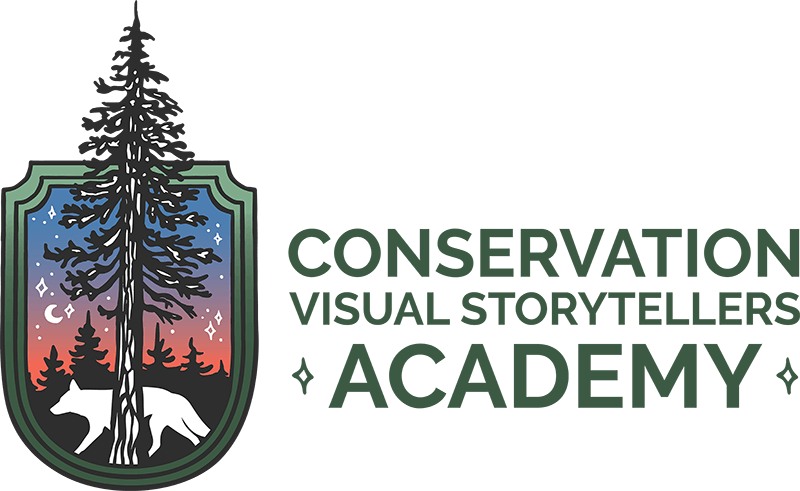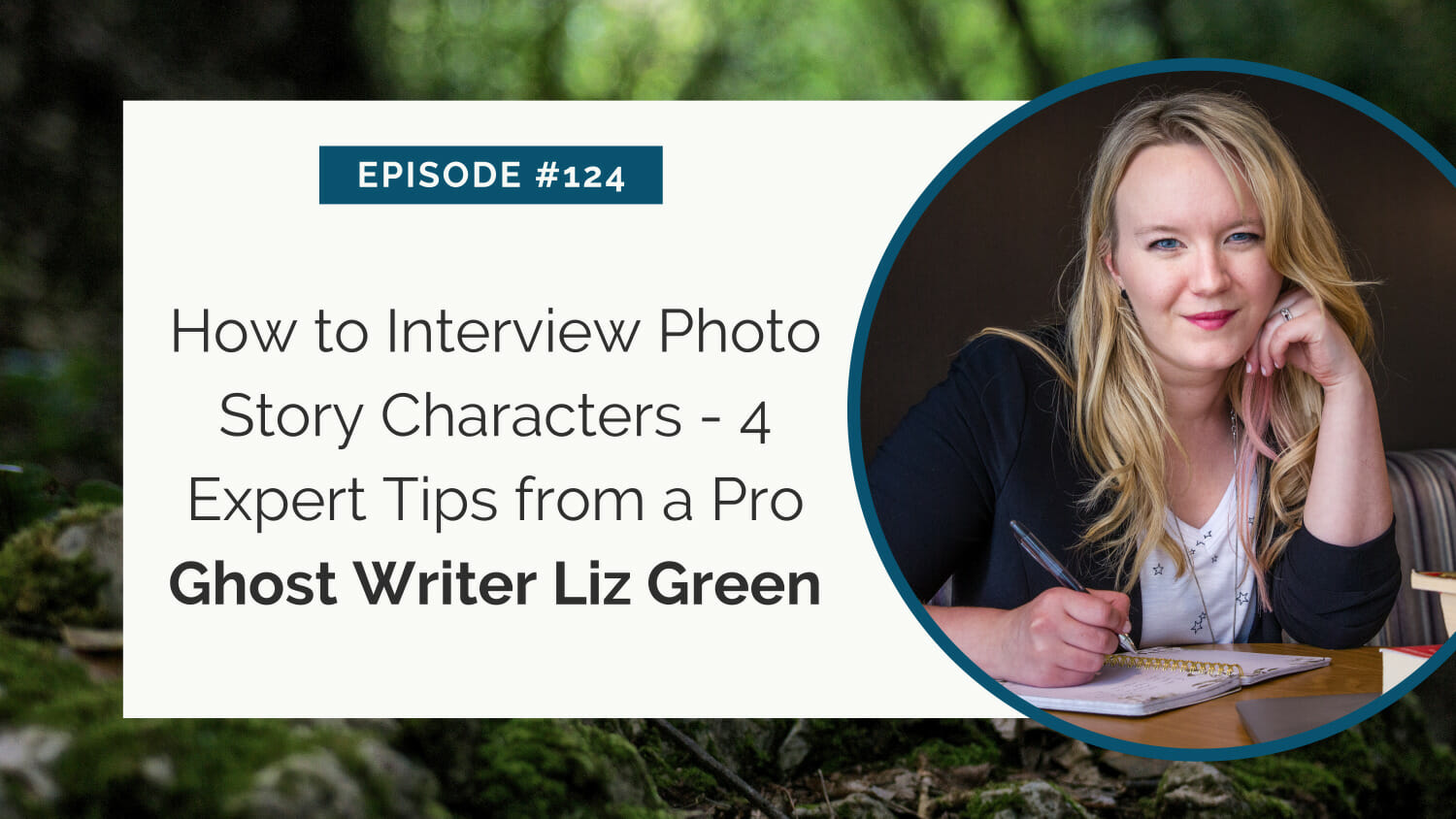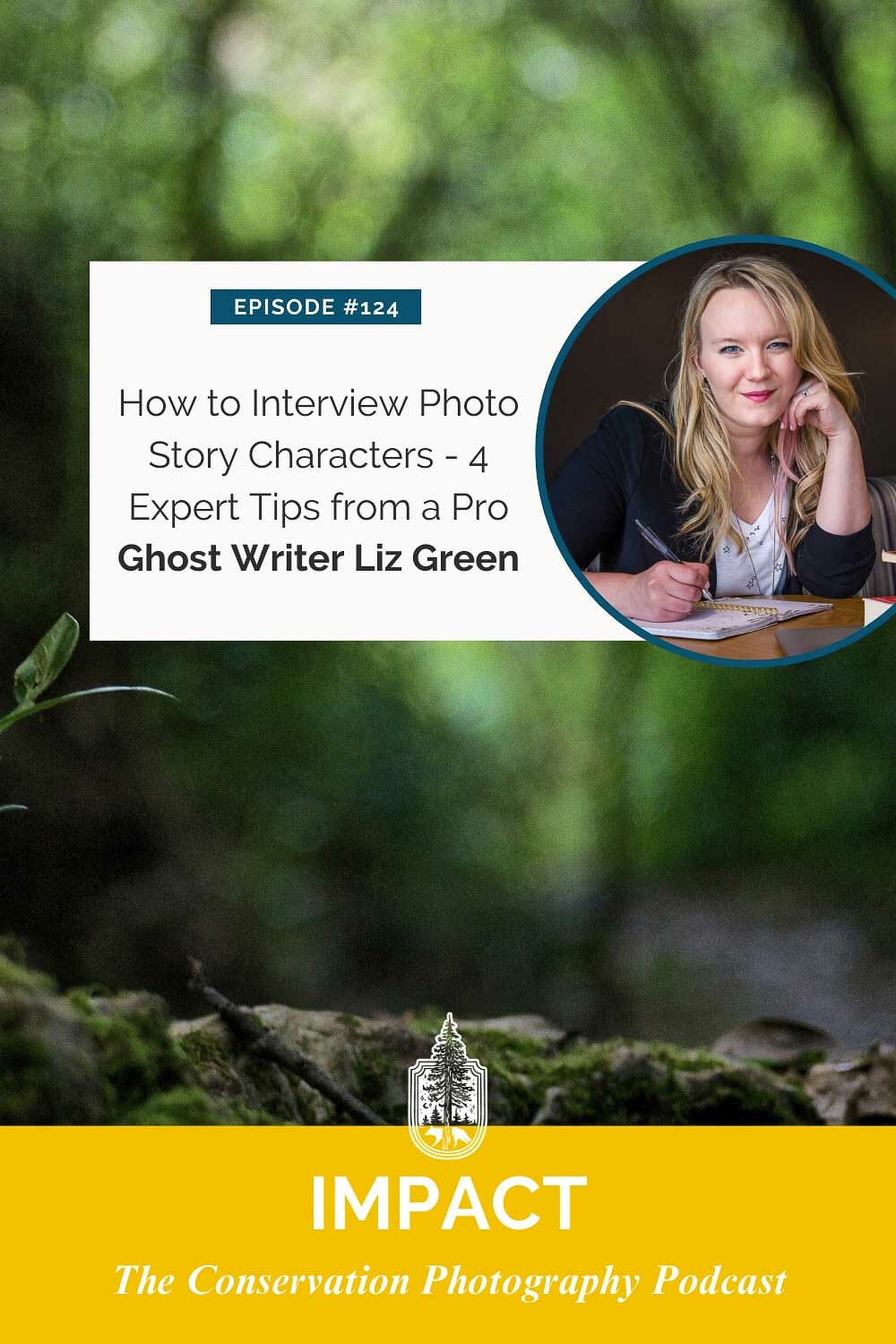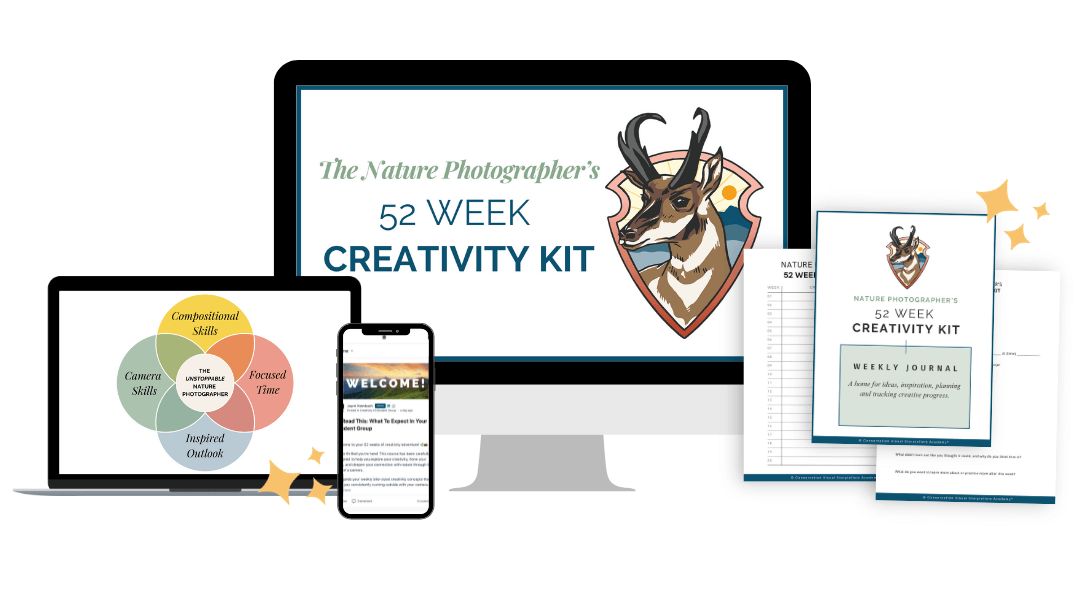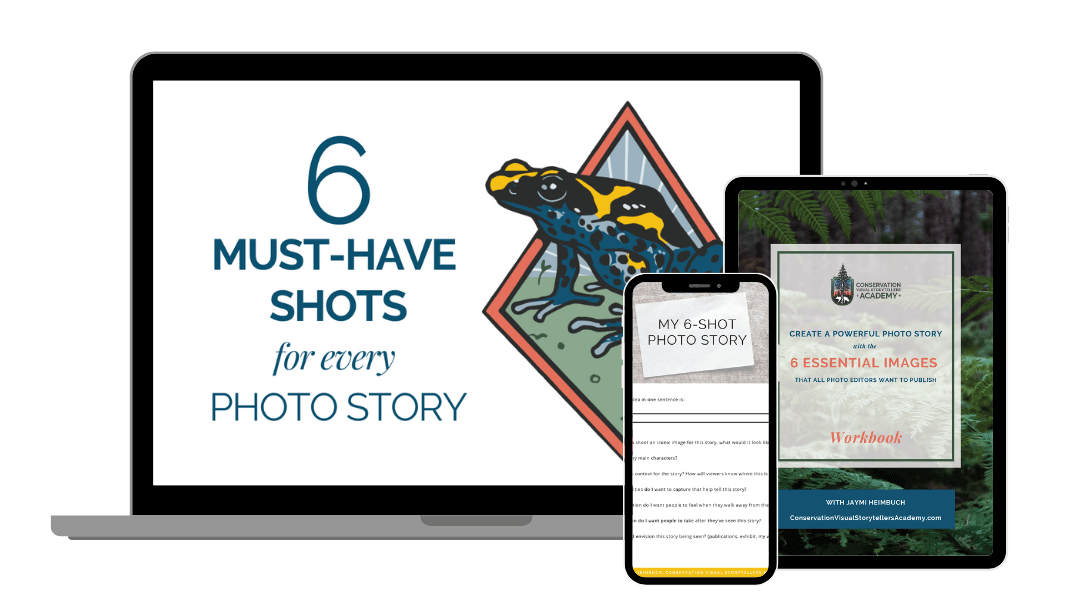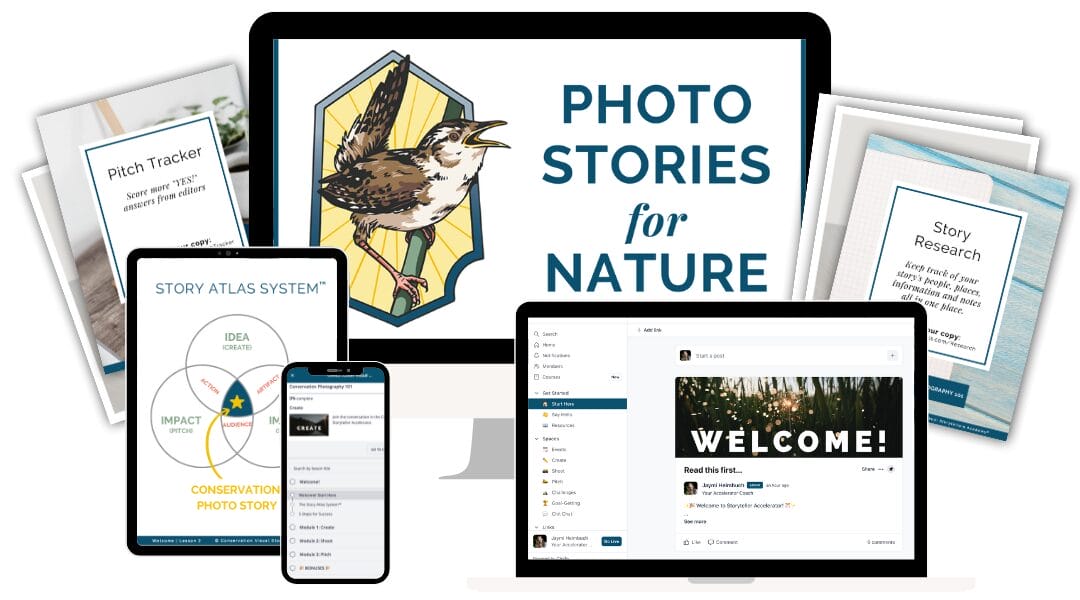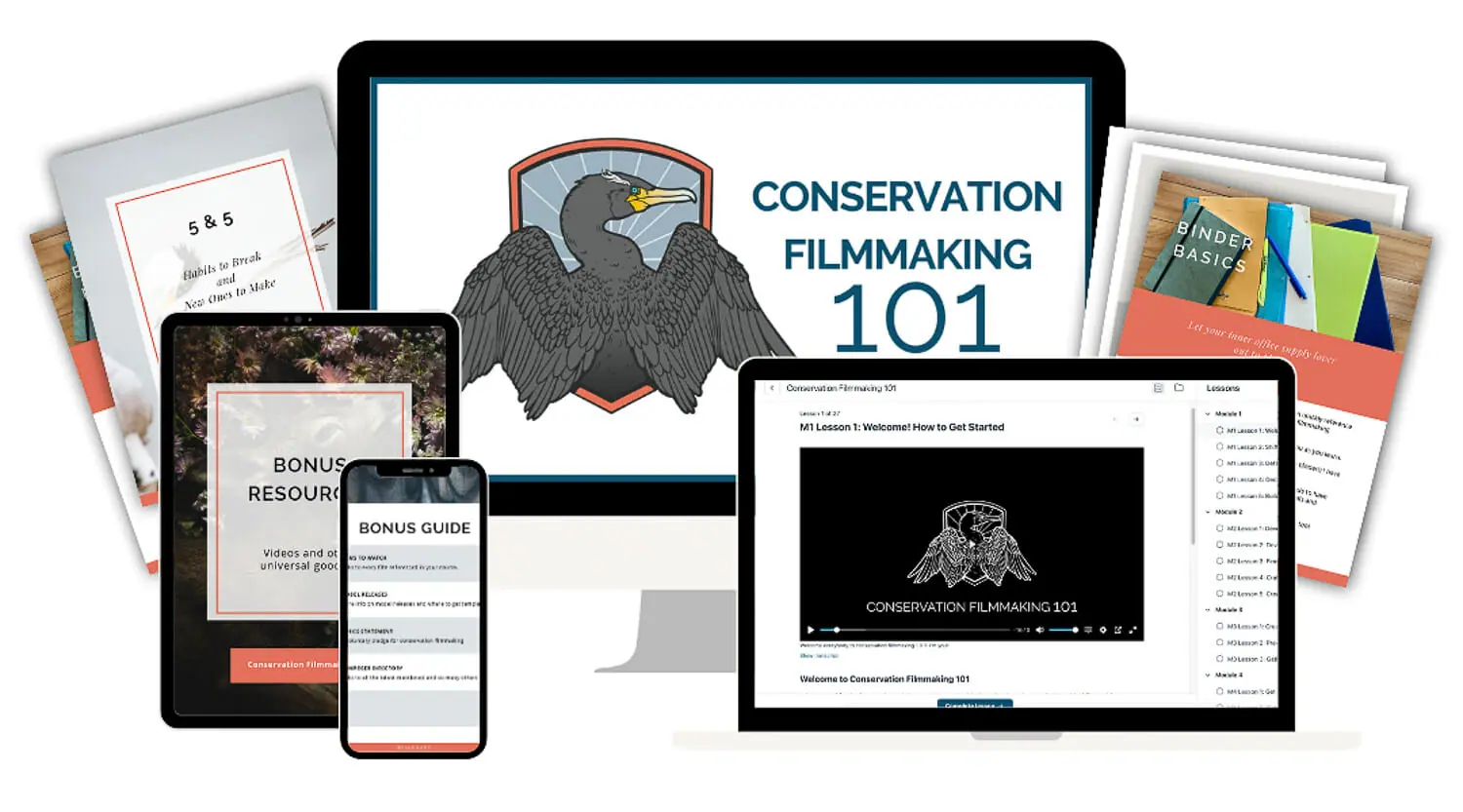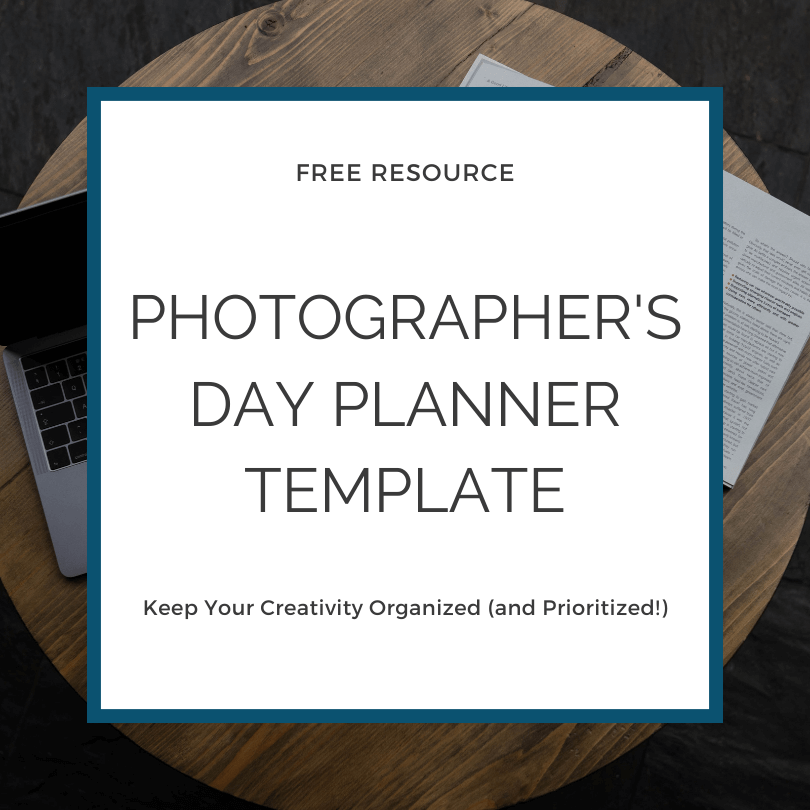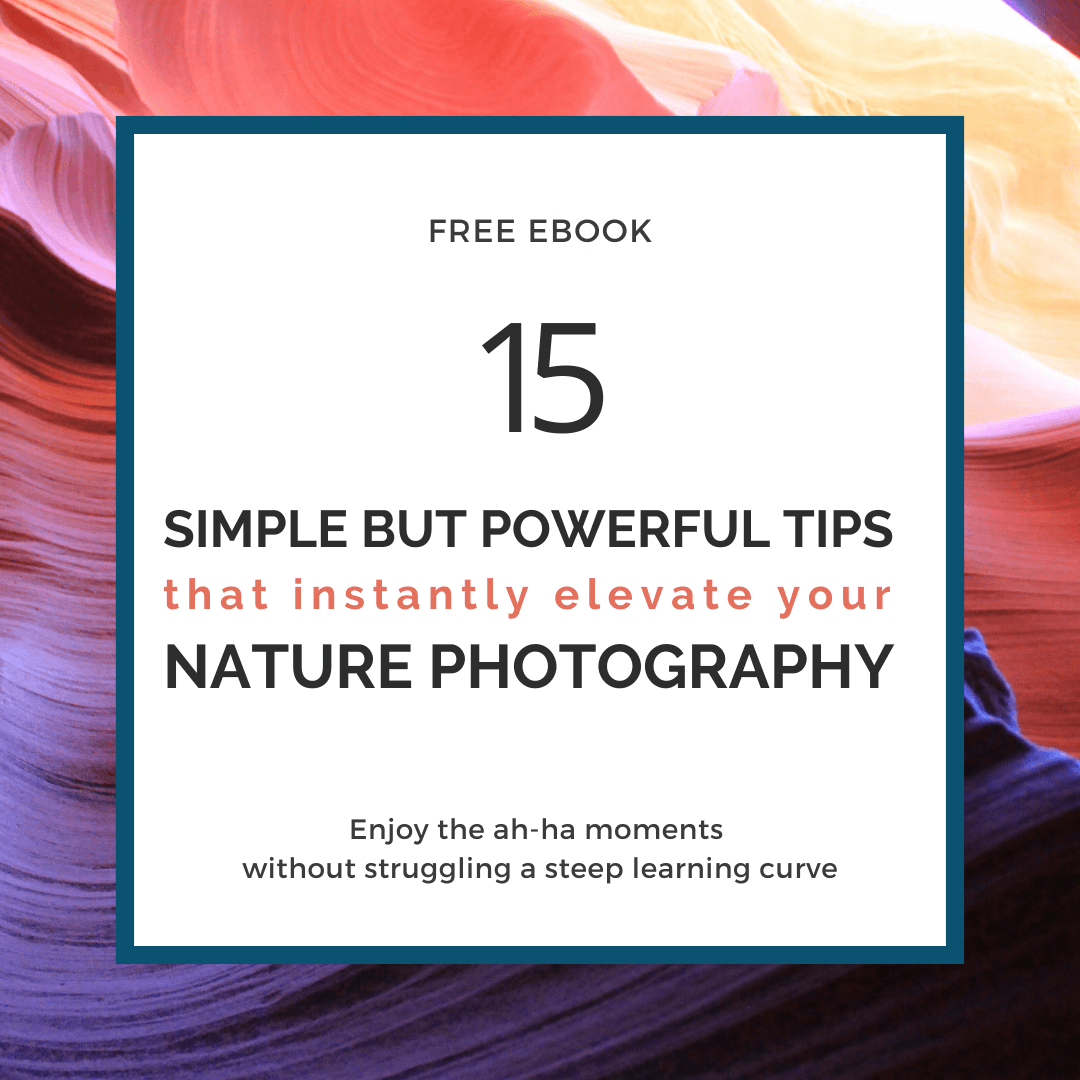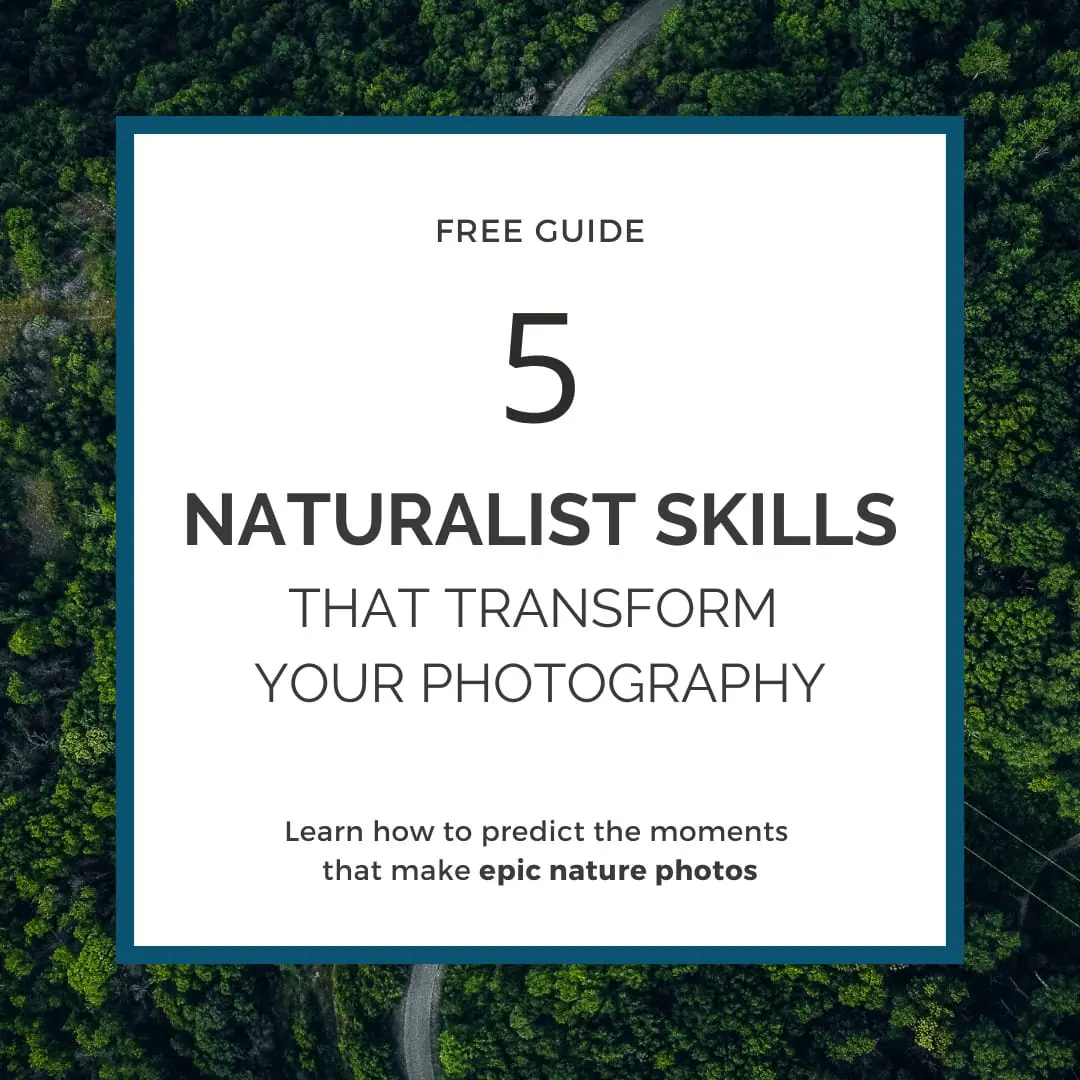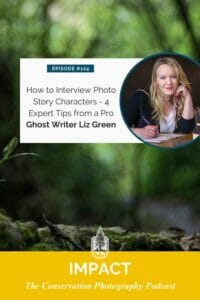How to Interview Photo Story Characters – 4 Expert Tips from Pro Ghost Writer Liz Green
Great photographs stem from great opportunities. And when you're photographing people, great opportunities stem from great conversations.
Interviewing your story characters is your chance to build a relationship and uncover important storytelling details that'll inform your images.
So today, we're diving into essential interview skills that'll smooth the way to outstanding photos for your stories – straight from a professional ghost writer who has spent thousands of hours interviewing characters!
Liz Green of Green Goose Writing is an editor, book coach, and ghost writer. Her career centers around helping people who want to write a book they know will inspire others, but are stuck trying to get the words on the page.
This means spending hour upon hour interviewing them to tease out the ideas, stories, experiences and knowledge that ultimately shapes a best seller.
With thousands of hours of interviewing under her belt, Liz has learned a LOT about conducting successful interviews that make everyone feel comfortable and relaxes so that the best creative potential can roll forward.
What you learn in this episode is useful for ANY time you're going to photograph a person, from volunteering at local nonprofits to assignment work!
You'll Learn:
- The importance of creating your interview space
- Strategies for structuring interview questions
- Smart ways to help your interviewee relax and open up
- And ensuring YOU have fun during the interview process, too.
Resources Mentioned
Episode 124: How to Interview Photo Story Characters - 4 Expert Tips from a Pro Ghost Writer
Shownotes: ConservationVisuals.com/124
(Digitally transcribed, please forgive any typos)
Jaymi Heimbuch:
[00:00:00] Jaymi: Welcome to this episode of Impact, the Conservation Photography podcast, and today we have a unique guest that I am super excited about. Liz Green from Green Goose writing. Welcome, welcome, welcome.
[00:00:14] Liz: Thank you for having me, Jamie. I'm really excited to be here.
[00:00:17] Jaymi: Awesome. So we are diving into a topic that I love digging into. And that is interviewing people. It's something that my conservation photography 1 0 1 students often talk about. Cuz as photographers we're always thinking about what we do with our camera and photographing people, but a big part of conservation, visual storytelling also comes down to interviewing people, and that can make a lot of folks nervous. I know it makes my students nervous. That's why we talk about it so much. And so I thought, Hey, let's bring in an expert.
[00:00:50] Jaymi: So I'm so excited to have an expert here to talk about it. But before we dig into all of that, let's kind of reel it back a little bit. Liz, who are you in the world for? Anyone who's [00:01:00] never worked with you.
[00:01:02] Liz: Yes, good question. So, as you said, my name is Liz Green and I am the editor, book coach and ghost writer behind Green Goose Writing. So I help people who want to write a book to inspire others and share their message to get the words on the page. Often people come to me when they know they wanna write a book, they have something to share.
[00:01:24] Liz: They wanna get it out there, but they feel stuck writing those, getting those words down. So I help them finally finish their book and feel proud of sharing their message with the world.
[00:01:35] Jaymi: . So, so much of what you do I know revolves around really high quality interview skills because that, I assume is how you tease that out of them. So what kind of got you into ghost writing and what have you learned about other people in this work that you do?
[00:01:54] Liz: Yeah, so I originally went to school for journalism and, uh, worked in public [00:02:00] relations and marketing because I immediately discovered that I was not hardcore enough to be a journalist, not really cut out for that world. That's, that's a lot more gnarly than I can handle. So I went to work in public relations and marketing and uh, eventually started my own.
[00:02:16] Liz: And I started writing blog posts for small business owners wedding event planners, wedding photographers, . I started with one wedding planner. She had a wedding photographer friend who had a wedding florist friend. And before you knew I was writing blog posts for all these people who owned their own small service based businesses.
[00:02:38] Liz: And I was helping them share their work with the world. And the really interesting thing about helping. Writing their blog posts was that each had to sound like who they were as a business, as a brand, as individuals who interacted with their customers. And I had to really start paying attention to what kinds of words would this [00:03:00] person use?
[00:03:00] Liz: How would they phrase this? How would they tell this story? And eventually I started doing more what's called ghost rating. What I was initially doing where you're writing on behalf of someone else, and that morphed into working with editors and eventually working on books. So today in my ghost writing side of the business, people come to me when they've got a book that, a message, something they wanna get out into the world, but they perhaps don't feel confident in their writing skills.
[00:03:32] Liz: Maybe English is their second language or maybe they just don't have the time cuz they're running their own business. But they wanna share this message so they, we get. Video calls and they tell me their stories, their message, everything they wanna share. And my job is to put their words in their words with their mannerisms down on the page.
[00:03:53] Liz: So that means I really have to draw everything out of them as much as I can, as if they're, you know, telling me their whole [00:04:00] story. So, like you said, I spend my days interviewing people over and over and over again, and not just interviewing them, but trying. The heart of what they're wanting to communicate out of them so I can then put it on the page on their behalf.
[00:04:17] Liz: So yeah, I do a lot of interviews and I think this the reason I've been successful in my business in helping people. Create books and share their messages is that I've kind of got a good eye now for how to get people comfortable, get people willing to talk to me, and willing to share their message and get the really interesting, juicy stuff out.
[00:04:40] Liz: And sometimes the stuff that they didn't even realize they had in them, but once they see it, they're like, Oh yeah, that's what I really wanted to say. And that's really satisfying for me.
[00:04:51] Jaymi: Oh my gosh. I love hearing all of this so much because as you're talking about this process for writing, it mirrors so much of [00:05:00] what we do when we're working with people as characters in our visual stories because conservation photographers are typically documenting. An issue or characters who are involved in an issue.
[00:05:12] Jaymi: We're working with scientists, conservationists interesting community characters people who do, who work with wildlife. Like all kinds of people come into the stories that we shape. And so often, yes, we are taking photos, but it is our job to really understand. Who the people are that we're working with, how do they feel about the issue?
[00:05:33] Jaymi: What does their job look like and it can feel, especially when you're getting started working with people. It can feel really awkward. And how do I get this person comfortable with me when I kind of feel uncomfortable?
[00:05:46] Jaymi: I feel shy. I feel like I don't wanna be a burden. I feel like maybe I'm passing them or I can feel how uncomfortable they are. And so the idea that. You are an expert in getting people comfortable and getting them to [00:06:00] open up and share their story and who they are. We have so much to learn from you.
[00:06:04] Jaymi: I'm so grateful that you're gonna nerd out with us on interview skills today.
[00:06:09] Liz: Yeah. Well, I'm glad to too. And one of, Yeah. One of the reasons that I'm glad to share is because there are some little things you can do, even if you're inexperienced, even if you're nervous, that can be so effective at transforming your interview experiences. So I'm really pleased to get the opportunity to share some of those with you, because you don't need to be an expert to amp up your interview skills and really improve the.
[00:06:36] Jaymi: Wonderful. Wonderful. Yes. Brought some of your top tips for great interviews and I know that, well, all my listeners will be excited about this, but especially my conservation photography 1 0 1 students, cuz we're in the student group a lot batting back and forth, Oh, well, is anyone else nervous about interviews?
[00:06:54] Jaymi: Here's my tips, or here's what you can try and you know, it's part of the course as well, so to hear. Even more [00:07:00] about just little tweaks that we can make in how we approach something or how we're thinking about something. It's gonna be profoundly helpful. So what are the tips that you brought for us today for interviewing?
[00:07:12] Liz: Yeah, I've got four top tips that I wanna share with you, and I chose these because I think they're really small things that are very manageable to do. Three of them are things you can do in advance before you even get in a room. with your interviewee. So there's no pressure on you. You're not having someone stare at you, you're not on a time crunch.
[00:07:36] Liz: You can figure these things out in advance on your own time and it, it helps set you up for success. And the fourth one is something you can do right at the beginning to set you up for success as well. And they really take the pressure off and they can transform what comes after in the actual interview. The first tip I wanna share is to set up your interview space. [00:08:00] So you're gonna do your interview in a physical space, either in person with your interviewee, or on Zoom if you are preparing in advance. And the thing we tend to forget is that both you and the person you're interviewing are human
[00:08:17] Liz: Yeah. We're humans. Unless you're talking to like a cat or an elephant or something, but you know, preparing to photo photograph them. But I'm gonna leave those photography skills to you when you're interviewing , a real human being. They're a real human being and they've got feelings and emotions and distractions and thoughts going on.
[00:08:40] Liz: What we can do to set us up for success is craft the interview space to put both you and the person you're interviewing at ease. This will help so much because it just lowers the anxiety in the room a little bit, which is normal. It's normal for everyone to be a little bit anxious when we're [00:09:00] going into an interview cuz it's not your regular one of Themi thing that most of us do every day.
[00:09:06] Liz: So it's normal for there to be some anxiety there. If we can lower that anxiety, get everyone feeling a bit more relaxed, a bit more chilled out, we're much more likely. Better responses to our interview questions and more interesting responses, more natural connected human responses. So we wanna take the time to make it a more calming, chilled, less anxious environment.
[00:09:35] Liz: Whether it's online or in person. So I want you to spend some time paying attention to what that environment looks like. And there are a couple of things right off the bat that you can do to make it more comfortable. So for example, if you are on Zoom, having a, or any video chat platform, having a conversation in advance of, you know, getting together. Look at your web camera. [00:10:00] So often when we're on Zoom, we look down at the screen at the person's eyes that we can see on the screen in front of us. What happens on the other end is that you're looking about two inches below the camera below where they're seeing, so they see you looking into the middle of the screen.
[00:10:16] Liz: They don't see you looking into their eyes. If you can talk. Looking directly into your web camera, it looks like you're looking into their eyes and that makes them feel like you're actually trying to connect with them, which makes them wanna connect with you in return. So that sets you both up for a good interaction.
[00:10:36] Liz: A little sneaky trick I have with Zoom for doing that is you can set it up to show the speaker view and then you can tuggle onto a different window and it gives you this little tiny pop-up window with their face in it, and you can drag. Popup window all over your computer screen. If you drag it up so it's sitting right underneath your webcam, then you can look at this little tiny picture of [00:11:00] them.
[00:11:00] Liz: You're not getting the full blown picture of them. But that's not what's most important here. What's most important is making that eye connection and that human connection. So drag that little window with their picture in up to right underneath your webcam screen, and then you can look at them and it looks like you're looking right into the webcam and connecting with them.
[00:11:22] Jaymi: It's funny because you're doing that exactly right now and I've just come off of several other meetings just today with Zoom and I've gotten so used to not making eye contact with people because they're looking at me on the screen, or you know, I try and at least have their video. Near my webcam so that I can do the best that I can.
[00:11:42] Jaymi: But I know often I'm not making eye contact. And here you are staring directly into my eyes, even though we're on computer screens. And it really is very noticeable. Like I feel very connected to you versus , Oh yeah, we're not looking, we're not making eye contact because we're both on Zoom. So what a, what a brilliant trick.
[00:11:59] Jaymi: And [00:12:00] the thing about eye contact, I think we underestimate how deeply connected it makes us feel to other people when we do this. So for conservation photographers, if this is the first time that you are meeting a subject matter expert, or the first time that you are talking with a character about what you might wanna photograph about them or, or finding out more about their story, really having that bond start to be crafted from the beginning is huge.
[00:12:24] Jaymi: And what a simple trick to profoundly heighten.
[00:12:29] Liz: Yeah, and it's funny how much these little things make a difference because they're not commonly done. You know, these days when we're on Zoom so much, it's not commonly done, but anything you can do like that to improve the environment, having a quiet area around you, this one's great for in person as well.
[00:12:47] Liz: Sometimes you'll go into a room and there's a lot going on. People are setting up for um, the shoot or there's, you know, animals around and things are a bit hectic and crazy and there's [00:13:00] a lot of distractions, which inevitably take both of you away from looking at each other. If you can find a quiet corner where you can sit down together and it feels like just the two of you are in conversation without all the mayhem around you, that can create that bond, that connection, that sets you up for success as.
[00:13:20] Jaymi: Wonderful. That sets you up for success, not only in the interview itself, I think, but also in ultimately the images that you'll make afterwards because , you're setting the stage for calmness in the interview itself, which then builds. Calmness and trust and comfort and everything for when you actually do end up picking your camera up, which typically when you're working with people doesn't come for a while.
[00:13:45] Jaymi: It comes after you've spent time talking with them and connecting and understanding them. It's a while before you actually pick up the camera to document something in many, many circumstances. And so this is that opportunity to get calmness for the [00:14:00] questions you're about to ask, but also. I feel like it's setting the stage for calmness when you actually lift up the camera and maybe the anxiety will will rise a little bit, but not nearly as much as if you never took the time to set that setting.
[00:14:14] Jaymi: So I love that tip.
[00:14:15] Liz: Yeah, it gives you a jumpstart into the process.
[00:14:18] Jaymi: Absolutely.
[00:14:20] Liz: So take the time in advance to consider how you're going to craft your interview space, whether it's. Online or in person, having the quiet room, knowing you're gonna look them in the eye, knowing you're gonna find a quiet, cornered speaking, whatever that might be.
[00:14:37] Liz: If you take the time to craft your interview space in advance, that's really gonna help. And that's, that's tip number one. Tip number two is, Also something you can do in advance. I want you to structure your questions in advance of meeting up with your interviewee. So you are gonna sit down before you have your session and you're gonna think [00:15:00] about What you wanna ask them, which sounds obvious, but I want you to take it a little bit further.
[00:15:05] Liz: We're not just thinking about what you want to ask them, we're thinking about how you're going to set them at ease through your questions. So don't go straight into the big, deep, profound questions. We, if our goal is to set our interviewee at ease so that they feel calmer, more trusting, more willing to open up and give better answers, then you wanna give 'em a couple of early wins.
[00:15:32] Liz: At the beginning of the interview, so ask some easy questions at the beginning. What's your name? What is your job? What do you do here? Even if you know that stuff already, the point isn't just your information out of them. The point is to make them feel comfortable so they can speak more openly. So what questions Can you ask that again, to be easy wins for them that are gonna prove to them.
[00:15:55] Liz: This is gonna be okay. This isn't scary. They've got this. They can handle [00:16:00] this because they're just as nervous as you are. Probably. They may never have given an interview before, or certainly not many, so give them some easy questions at the beginning. Stuff that gets some chatting, gets some, realizing this isn't such a big deal.
[00:16:14] Liz: This is okay. I can relax. I got this. And then you can get into your more challenging or profound or interesting questions further down the line. So before you go in, structure your questions, not just think of your questions, but structure them so that you take them through this journey of getting at.
[00:16:36] Jaymi: Interesting. So at Green Goose writing, when you're sitting down with a client for maybe the first time or even the second time for getting going, and you wanna give them these easy wins. Do you use a strategy based on what you already know of their personality? Like would you throw in some quirky, silly questions to get them laughing if you know that that would help?
[00:16:58] Jaymi: Or would you throw in, [00:17:00] I don't know, some kind of calmer personality driven questions if you know that they tend to be more introverted? Do you ever structure based on what you already know of them or does your kind of easy win questions typically look the same?
[00:17:12] Liz: They typically look the same because I tend to let people, Just talk and ramble. And typically I won't get a lot of good material out of those first few questions, but I'm willing to spend the time on them. And my time is always limited. We always have a set time amount, so I'm always on the clock, but I'm willing to spend that time on questions that aren't gonna give me good answers because it sets us up for better answers down the line.
[00:17:41] Liz: So most questions are typically Things that I know will open the door to let them just talk a bit. Just get, get their mouth moving, get them going, get them revved up so you know what's going on today. What brought you into this job? What do you like about [00:18:00] this work? You know, it's like You know, questions that you'd ask at cocktail hour.
[00:18:04] Liz: When you meet someone new, they're not particularly mind blowing but they get them talking, they get them going, they get the, the gears moving and, and, uh, I keep my own the clock. So I, if they're, if they're a talker, as some people are, some people need time to open up. Some people will go and go and go. So I keep my eye on, on the clock and I make sure they're not rambling too long before I get to.
[00:18:30] Liz: The questions that I've considered more deeply that I know are more likely to give me fruitful answers. So, you know, I'll, I'll make sure we're not going too, too long on these, but I do think it's worth spending the time on those. And yeah, just those average cocktail hour questions that you'll ask when you meet someone new at a dinner party, what is it you do?
[00:18:51] Liz: Oh, how'd you get into that? That sounds interesting. That kind of stuff.
[00:18:56] Jaymi: so that's a really, uh, interesting tip. And before we move on to the other [00:19:00] ones, I kinda wanna dig in a little bit more into the, the interview experience itself, cuz you mentioned that you keep an eye on the clock and manage time. What is it like to really manage and respect people's time? Is there sort of like a minimum interview time amount that, you know, like if I don't get at least this amount of time with.
[00:19:20] Jaymi: Then I'm not gonna really get the information that I need. Or can you adjust that based on like how snappy an interview needs to?
[00:19:27] Liz: That's a really good question. I don't like to go less than 20 minutes because I like to give this time, this kind of padding time for softening things up and getting things flowing. And that does take a bit of time. And if you are interviewing someone who's used to being interviewed, who you know, this is a regular part of their life, experie.
[00:19:50] Liz: Then you can shortcut that. You know that they're gonna be good to go. You can just hit them straight with the questions. But those aren't the kinds of people that I find myself [00:20:00] interviewing most of the time. So if you know that that's somebody who you're interviewing, then you can go shorter. But otherwise, I'd say at least 20 minutes.
[00:20:09] Liz: And I don't like to go longer than an hour, which is for my books are for very in depth. You might not need that much time for an article. But the other thing that happens at the other end of the spectrum is that people get fatigued. They aren't used to talking about themselves that much. So around the 45 to 60 minute mark, people are gonna start to, to.
[00:20:31] Liz: Not give such good quality responses. So there's really that sweet spot in the middle where you've warmed them up nicely, you know, 10, 15 minutes in, 10 minutes in, they're going. They're really warmed up and talking nicely, but they haven't got fatigued from talking about themselves yet, or from asking those questions, which for the people I work with, tends to be about 45 minutes.
[00:20:54] Liz: But these are really broad timeframes and it's gonna vary very much depending on [00:21:00] how used to people. In talking about their work, and this may be informal interviews, but it may be in other situations. For example a zookeeper who does presentations every day to school groups and has q and a sessions at the end, is gonna be very comfortable being asked about their work because they get, you know, people putting their hands up and asking them questions every day.
[00:21:24] Liz: So they're gonna be more comfortable. You can probably go faster with them and they are less likely to get fatigued. Somebody who doesn't have, you know, a lot of person to person interaction, maybe they're just working with the animals is you might wanna be a bit more conscientious around that timing.
[00:21:44] Jaymi: Wonderful. Awesome. So we have really being mindful about setting up your interview space beforehand. So taking the time to, if you are doing an online interview to be in a quiet room, set it up so that you can basically look [00:22:00] at them. So the window with their face on it is right under that camera on your computer so you can really look them in the eye if it is in an in-person space, making sure that you're in a quiet area, being conscious of what, even if you're in a bustling area, being conscious of, maybe there's a quiet corner that you can then kind of pull them into.
[00:22:18] Jaymi: I'm totally thinking of when Rita Skeeter pulls Harry Potter into the closet. interview in the closet. Uh, the, uh, and then, so those are the two things. And then the bonus that you let us know about is really thinking about that timeframe and knowing how likely or unlikely it is to be able to jump straight to kind of the meat of the conversation.
[00:22:38] Jaymi: Wonderful. What, what is the third tip that you have for us?
[00:22:42] Liz: The third tip, again, this is another one that I want you to do in advance before you even get into the room, is to manage your mindset. A lot of us are, a lot of people are nervous going into interviews because they feel like they're. Bugging someone or they're in the [00:23:00] way, or they're gonna be under fur and they don't know what they're doing, and this person's gonna think they're an idiot.
[00:23:07] Liz: And all these thoughts come around us and they all make us come across a little bit more nervous in the interview, which has the knock on effect of making the interviewee feel less confident, less calm, less comfortable. And you know how this goes. If we can manage our mindset before we even get in. , then we can come across more comfortable and confident, which inspires confidence in the interviewee, which makes them more likely to give us better responses.
[00:23:37] Liz: So what does that mean to manage your mindset? Really it means giving yourself a pep talk before you get in there. And you may not believe your pep talk at the beginning, but you're gonna give yourself a pep talk and you're gonna keep saying it over again. To. Boost yourself to amp yourself up to remind yourself of why you're not bugging them.[00:24:00]
[00:24:00] Liz: And here's the thing, you know, after interviewing, gosh, I don't even know how many people over the years, thousands. The number one experience I've seen with interviewees is that they are so incredibly flattered to be interviewed. They are just, it makes their year to have someone sit down or want to ask their opinion, ask about their ex.
[00:24:26] Liz: Experiences, you know, they will go home and tell everyone about their day. You won't believe what happened to me today. I had somebody, a photo journalist, come and interview me and they ask me this, and they ask me that, and we've gotta look out for the magazine and I can't wait to show everyone and they're gonna sends to everyone.
[00:24:49] Liz: People are thrilled because this doesn't happen to most of us most of the time. Most of the time people don't care what we do in our everyday job. [00:25:00] You know, your partner might say, How was your day when you come home? But really, how often are people sitting down and licking you in the eye and asking you.
[00:25:09] Liz: Really genuine questions about what you do for most of your waking hours. It just doesn't happen. So it might make people a little uncomfortable at the beginning, but they are genuinely thrilled to have someone ask them this. This is an experience they don't get very much in life. So I want you to go into your interviews remembering that you're giving someone the gift of attention.
[00:25:38] Liz: and genuine interest, and this is a gift that they are really unlikely to receive most of the time, most of their days. And you have this amazing opportunity to look them in the I and be genuinely interested in this career that they have chosen to give their life to the best part of their life too.[00:26:00]
[00:26:01] Liz: That's cool. I think that's amazing. How many people in the world can give somebody an experience like that?
[00:26:07] Jaymi: Yeah, I love. Phrasing of you're giving them a gift. Because think that we, I don't think I've ever heard anyone say it quite like that, that, you know, we, we often phrase it like, Oh, well this is an opportunity for them to tell their story, or I'm helping them get their story out into the world.
[00:26:28] Jaymi: Or they're, them being part of this is gonna help something else. Or, So ] , I feel like we are often positioning ourselves as the role of helper, but then also the idea of providing a gift to someone to be like, I am creating this opportunity to, for you to have a genuine moment of someone appreciating deeply what it is that you do, the contributions you make being grateful for everything that you're doing and being part of this story, that that's a gift.
[00:26:57] Jaymi: That is a really interesting way of thinking.[00:27:00]
[00:27:00] Liz: Yeah, and it's not that people are sitting around going, Oh, I wish somebody would give me this gift of being interested. Nobody's conscious of wanting this because it's something that's so out of consideration for most of us. But consistently with my book writing clients, you know, at the end of them, the projects I always ask, you know, How was it?
[00:27:23] Liz: What could I do better? What? What did you enjoy, blah, blah, blah. Consistently they say, I'm really proud of my book. I'm so thrilled to get it into the world, But I was most surprised at how much I enjoyed the interview sessions. It felt like sitting in a cafe, talking things over with a friend. It helped me hone my ideas.
[00:27:42] Liz: I so enjoyed those interview sessions and people do, they really do enjoy them and I think we're very privileged to be in professions where we can give that experience to people.
[00:27:54] Jaymi: I love that. What are some of the, if you're willing to share some of the like pep talk [00:28:00] phrases that you give yourself when you're about to sit down with a client,
[00:28:05] Liz: I remind myself that they have agreed to this . You know, it's not like you're cusing them in the street and pinning them against the wall and forcing a conversation out of them. They've literally agreed to sit down with you So they're on board for this and. I remind myself of what they do.
[00:28:30] Liz: I think about what it is they want to share, or you know what little I know of it going in. You always know at least something about it going in, right? So I think about that and I try and engage myself in what it is that. I'm curious about what it is that makes me genuinely interested. I think about what they're doing and what we're gonna talk about so that I can Engage that interest in myself because it will come across [00:29:00] to them.
[00:29:00] Liz: And when I'm genuinely curious and interested and kinda excited to be like, Huh, I, I dunno much about this. I wonder what they're gonna say that comes across to them. So I spend some time. Yes. Reminding myself that they've agreed to it, that they're on board, that they're excited for this, and sometimes thinking about what I'm genuinely interested in learning or getting out of this experience, cuz that's gonna come across when I sit down with them.
[00:29:31] Jaymi: Have you ever had to give yourself a pep talk for an interview where maybe you didn't like the person or you disagreed with the person that you were working with? I'm assuming Probably not since you were taking on clients, You know, by choice in conservation often. It's our job and our responsibility and our duty as we're telling a story thoroughly to sit down with people who are, you know, on the other side of a fence about a topic or are part of [00:30:00] the problem that we're documenting and that we might have some fundamental disagreements with.
[00:30:04] Jaymi: But at the same time, we have to stay very open and. in a very trustworthy trust earning way. Share their side of the story too, but it can be kind of psychologically, emotionally tough. Have you ever been in a situation like that, or do you have words of advice for being in an interview situation and keeping your mind open, keeping that curiosity open?
[00:30:27] Liz: Yeah. I think the first thing to remember is that it's okay to go into a situation like that and feel. Not all sunshine and rainbows about the person you're interviewing. You can still get a great interview. You don't need to be fully excited and on board with them to get a great interview. So that's, it's okay.
[00:30:52] Liz: Of course, if we're trying to build trust and open communication, you wanna manage your mindset in advance so that even if you don't agree with [00:31:00] them, you can get get to that point. So for me, what that involves, Reminding myself that this is an interesting opportunity to become more informed, to be able to speak better on this subject.
[00:31:14] Liz: You know, if I know more about the opposing views on a subject, then I can speak to them better. I can argue against them better if that's what I wanna do. I. Think the most powerful interviewers are people who are curious, willing to be curious. You can think, I don't like this. I'm not okay with this, but I'm curious to see where they're coming from.
[00:31:39] Liz: What makes them think this is okay when it's so blatantly not okay. . That's some, that's a mindset you can go in with. You don't need to be on board with. Pretend like it's okay to you. That's not necessary. You can, but you do need to be. Curious and willing to listen. [00:32:00] Even if in your own age you've got a little bit of ego and arrogance going on that says, You know, I'm just listening so I can tell, you know, tell other people why they're wrong.
[00:32:09] Liz: You're not gonna shout down your interviewee and tell them why they're wrong in the moment, because that's not respectful. You came to them and asked for. Words, their opinions, their stories. So you're gonna respect them in the moment, of course you are. And you're gonna be grateful for them being willing to share with you.
[00:32:26] Liz: But you can go in with your own mindset that says, I'm being curious. I'm willing to hear what their story is, even if it's just for my own better understanding of the, these issues.
[00:32:39] Jaymi: Wonderful. Thanks for that. I totally had the scene from Ted Lasso where he wins the . I don't for any Ted Lasso fans out there when he wins the darts contest and kind of hits it home that people who are curious are the ones that we really want to. Be like in this world because you stay open minded, you stay thoughtful.
[00:32:59] Jaymi: [00:33:00] And you ultimately, when it starts, Anyway, sorry for that reference. I I, I love that scene because it really does strike home that you can have your own opinions about something, but it doesn't mean that you can't set them aside and. Be very open and listen, and you come out a little bit stronger with the story that you're creating when you're willing to really, really listen to what someone has to say and build that comfort for someone, no matter who they are, No matter if it's a subject matter expert or a scientist or someone that you're really excited to be interviewing, or if it's someone who's critical to the story, but maybe you're not so thrilled that you're sit down with them.
[00:33:40] Jaymi: So thank you for that.
[00:33:42] Liz: I think the key really is to manage the mindset in advance so that you don't go in with all your, you know, your backup and your ego flaring and all the rest of it. If you can just clear some time, you know, it doesn't need to be long. 10 minutes before you go in [00:34:00] to get your head on straight and remind yourself why you're doing this and what you want, how you want to show up in this moment that's gonna set you up right.
[00:34:09] Jaymi: Wonderful. Thank you. And what is the fourth tip that you have for us for interviewing?
[00:34:16] Liz: Yeah. So this is one I want you to do right at the beginning of your interview. So we've done three tips in advance before you even go into the room. Now you're sitting down in the room with your interviewee, and I want you to take some time to set expectations. So this can be really straightforward, You say to them, You know, you do a bit of friendly banter.
[00:34:39] Liz: Oh, the weather's great. Yeah. How was traffic coming in? Oh yeah. All that stuff. And then here's what I wanna do. In this interview, I'm gonna ask you some straightforward questions. Then we're gonna get into some more interesting things. At the end, I'll ask if there's anything else you wanna share, and then we'll be done.
[00:34:56] Liz: You're literally just laying out, beat by beat what's gonna happen [00:35:00] next? And this removes the anxiety about what's coming next. When we're all in a new situation, we inevitably have a little bit of micro anxie because we don't know what's gonna happen.
[00:35:12] Liz: We dunno what this is gonna look like. How is this gonna go down? Just taken a minute or two to set expectations at the beginning by telling them exactly what's gonna happen next. Reduces that micro anxie, lets your interviewee kinda sink into it. Okay, good. I can do that. That's all sounds right. Not too scary.
[00:35:33] Liz: All right, let's go. And they're ready to go. and it, you might sound silly saying it because you're like, Well, this is obvious . It is ob. It might well be obvious. But just taking the time to do it is gonna relieve that anxiety and set everyone off on a better set. And the bonus benefit that it has for you is that it gets you flowing, it gets you talking, it gets you in the group.
[00:35:58] Liz: So you start off [00:36:00] sounding confident, like you know what you're doing, even if you have no idea what you're doing, you sound like you know what you're doing. And that gets you off going as well. So you can practice this in advance, or you can just run through it on the. And it's literally just thanks so much for sitting down with me.
[00:36:16] Liz: Here's how this is gonna go, and this is what you can expect and this is what we're gonna do after.
[00:36:22] Jaymi: I love it. It, it's amazing how much that little tiny thing like that to allow both the person that you're sitting with, but also yourself. Just remember, okay, this is just a process. Here's what it looks like. Okay, I know what it looks like. Now I can begin how calming that really is. Even though you're right, it does seem super obvious, but still, it's amazing how calming that is to know.
[00:36:44] Jaymi: What you're about to get into and how it's gonna end and that, yeah, it's not scary.
[00:36:50] Liz: Yeah. And I can see it in people's eyes when I get on calls with people, especially when we haven't spoken before and uh, we do, you know, the little bit of chit [00:37:00] chat, you know, Oh, how's the weather where you are? How's your weekend being? And I can see that eyes are kind of dying. They're sitting for, their shoulders are up, and I say, Okay, here's what I wanna do today.
[00:37:11] Liz: I'm gonna ask you a few questions so I can get a better sense of what you do. I'm gonna give you the chance to ask me whatever questions you have, and then if that looks good, we're gonna talk about what the process is next. Does that sound good to you? And they always say yes. Because nobody's rude and says, No but I see.
[00:37:29] Liz: As soon as they say, yeah, their shoulders drop, they sit back a little bit and really, I haven't given them that much information. I haven't told them any of the questions I'm gonna ask. I haven't given them that much, but it's just enough to take the edge off and let them slump back down a little bit and take a breath and be like, Okay, I can do.
[00:37:52] Jaymi: So we have these four, I feel like incredible tips. I feel like we just got a mini master class from [00:38:00] you in interviewing. So would you mind running through the four once more
[00:38:05] Liz: Yeah. Step number one was to set up your interview space in advance, whether online or in person to make sure it's gonna be calm and comfortable space for you to interview. Tip number two was to structure your questions in advance. So not just planning questions, but structuring them with your E so you get those easy wins upfront.
[00:38:29] Liz: Step number three was to manage your mindset so that you remember that you're not bugging them, you're not, you know, Cause an hassle or anything, but you're giving someone the gift of some attention and some interest, genuine interest. And then tip number four was to set expectations at the beginning of the interview so that you can relieve any anxiety and go in sounding confident
[00:38:57] Jaymi: . Thank you so much. And I know that there are [00:39:00] about a million other things that you learn and kind of master as someone who interviews people all the time from everything from. Setting your own tone of voice or pace to how you manage your notes or recording scenarios and all kinds of other things.
[00:39:17] Jaymi: And transcribing stuff. There's so much to interviewing people that can be complex. But a lot of it just comes down to these very seemingly simple, yet also quite critical steps at the very, very beginning of any interview process to set yourself up for success.
[00:39:33] Jaymi: And yes, we are just talking to other people, but if we can kind of bring it back down to that reality, like you said in the beginning, that we're talking to another human being it's just another conversation. And if we can set ourselves up to bring that, you know, nervousness and anxiety and everything about interviews back down to earth.
[00:39:50] Jaymi: Wow. What can come out of that is pretty amazing.
[00:39:55] Liz: It is just a conversation, and I'll do that as part of my setting expectations. [00:40:00] I will literally say to them, You don't need to sound good or deliver like good quality quotes or anything. This is just a conversation between you and me. It's on me to make it sound good when we write it up, but right now it's just you and me chatting so you don't have to sound good or do anything like that and you can see the relief come.
[00:40:19] Liz: Face when I say that, that's part of my setting expectations process. And then what happens is if you take the time and energy to set up this environment where there is more comfort and relaxation, they deliver. You don't have to deliver anything after. The pressure is not on you at that point. If you've set it up right, they are gonna be the ones who deliver the great lines, the great content, the interesting quotes.
[00:40:48] Liz: It's gonna come from them, so you don't need to worry at that point about being on form or delivering anything. You just need to make it comfortable for them to shine, and then they'll [00:41:00] bring their, their content to the table.
[00:41:02] Jaymi: Yeah, that is an interesting irony in that by saying there's no pressure on you to sound amazing or anything. This is just a conversation. and yet it is on them to deliver. But that puts them in the position of being able to deliver this amazing interview with all these insights because they don't feel like that expectation is on
[00:41:21] Liz: You Exactly. You become like a Jedi mind master
[00:41:27] Jaymi: Yeah. So thank you so much for all of these interview tips and I'm just curious a little bit more about your work at Green Goose writing cuz I'm, I'm wondering like, What is it like for you as the ghost writer to go through all of this process with people, these interviews, and then putting down into words who they are and the message that they have in their voice.
[00:41:52] Jaymi: What is it like for you when that comes out into the world? Cause we kind of heard about what it's like for them and, and what the clients love about it, but what's it [00:42:00] like for you as the writer,
[00:42:01] Liz: Oh, it makes me so proud. It makes me so proud because I work with people who have something really interesting, genuine, heartfelt to share, and. They know they've got something to say to the world. They want to spread their message further. Sometimes they just wanna leave a legacy. Sometimes they wanna pass on what you know, they've been privileged to learn and know and experience in their life.
[00:42:28] Liz: They wanna pass it on to the next generation, whatever it is that's motivating them. They usually, when they come to me, they're at a point where they know they can't do it on their own. They've tried and they're just stuck and it's frustrating. And so when I see. Their book published and they put it up on their shelf, on my bookshelf.
[00:42:50] Liz: I feel so proud because, you know, I don't necessarily feel like I've got anything particularly mind blowing to share with the world. And I don't know if your[00:43:00] your people feel the same, but I often feel like I don't. Do wanna think particularly amazing. I sit over my little writer's room and I tap away the keyboard.
[00:43:10] Liz: I'm not changing the world, but I can help people who are doing amazing things to get that message out wider, to change a little bit more of their corner of the world, to spread that message a little bit further. And that makes me feel really good. makes me warm and fuzzy inside, so, I think that's my little contribution to making the world a bit more of a better place is to amplify what others are doing.
[00:43:38] Liz: That's my privilege in my work and it makes me feel very good
[00:43:43] Jaymi: Man. I think that there's so many conservation photographers who are nodding along with you right cuz it, it often feels like, you know, many of us aren't necessarily the ones doing these big world changing things, but by documenting it, by getting it in front of audiences, [00:44:00] by showing other people what organizations or people are up to, or the effort that's going into conserving species or places.
[00:44:09] Jaymi: We really are contributing and that is a way that we get to make the world a better place through the images. And it feels, it feels really good to know that you're helping. It feels really good to know that you've helped amplify something. Well, I am deeply grateful to you for being willing to share so much very helpful knowledge with all of us so that we're all that much more prepared to help other people be comfortable, find out what's making 'em tick, and tell their story better. Through, through images and through words, both.
[00:44:41] Jaymi: So thank you so much for, for sitting down and nerding out with us on this
[00:44:45] Liz: Oh, you're welcome. It's my pleasure.
[00:44:47] Jaymi: So for anyone who is curious about what you do and to go see what's up at Green Goose writing, where can they.
[00:44:55] Liz: Yeah, I go to green goose writing.com, so it's green, like the color goose, [00:45:00] like the bird writing.com. And on the blog there in particular, I share lots of um, Inspiring writing advice, encouraging words about sharing your message with the world, sharing your work with the world. So if you ever feel like you need a little boost in that area or wanna join along with people who are interested in sharing what they're doing with the world, go to green goose writing.com.
[00:45:25] Jaymi: Thank you so much. And that link will also be in the show notes, so if you are listening along, just scroll right on down and you'll see the link in the show notes. Liz, thank you so much. I appreciate you and everybody will talk to you again next week.
